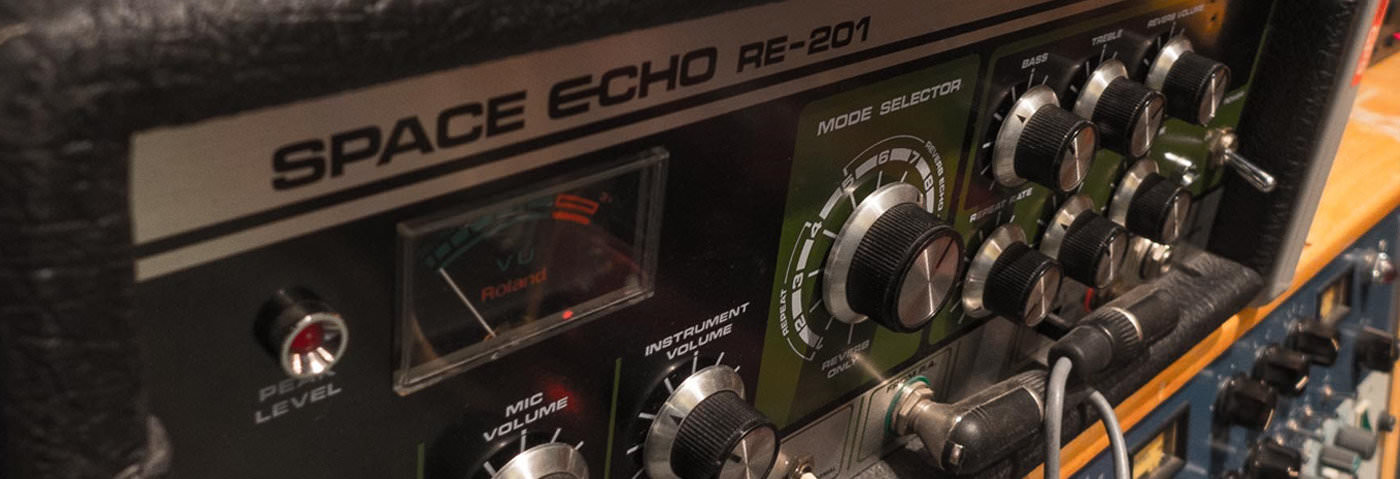In our latest Hardware Focus, we take a closer look at one of the most iconic echo effects of all time.
Regular readers of Attack will already know about the Roland Space Echo’s iconic status. In fact, let’s rephrase that: Anyone with even a passing interest in music production must surely have heard of the Space Echo at some point. Realistically, when we refer to “the Space Echo” we can also include the full range of related Roland tape echo units, from the lowliest RE-100 all the way through to the later RE-501 and SRE-555 Chorus Echo models. The added extras grew over the years, from spring reverb tanks to chorus circuits, but the fundamental appeal of all the models lies in their uniquely characterful tape-based delay effects.
Alex Ketenjian, lead engineer at Unreal Studio in Athens, describes the sound of his classic RE-201 Space Echo as moody, gritty and a bit rough around the edges: “Nothing sounds like a tape delay,” he tells us. “It’s the ultimate combination of delay, distortion and modulation via the never-totally-accurate transport.” Indeed, the beauty of so much vintage gear comes from the unpredictable nature of the ageing components. Despite not inventing the technology themselves, Roland managed to take an existing and rather unreliable bit of kit and turn it into a touring and recording studio standard. Historically, tape echo came about as a by-product of using tape machines to record audio. Engineers of the 60s and 70s realised they could create a small delay by altering the distance between the playback and recording head in a reel-to-reel tape machine. The Space Echo works in a similar way, albeit condensed into a smaller format with multiple playback heads for more complex delays. While most designs at the time used short tape loops, the Space Echo had a loose-spool, low-tension design, allowing for delay lines as long as three seconds – something previously unheard of.
The first models in what would eventually become the Space Echo series were released before Roland were even called Roland. The Ace Tone EC-10 and EC-20 were released in 1972, a year before Ace Tone morphed into Roland. The EC series morphed into the RE range, with the most famous model being the RE-201 Space Echo, released in 1974. The Space Echoes quickly found popularity among guitar players, then dub pioneers including King Tubby and Lee ’Scratch’ Perry, and eventually countless dance producers. The list of artists who’ve sung their praises on Attack over the years is long, and includes the likes of Zombie Nation, Mosca, Fred Everything, Reboot and Manik.
The same kind of words come up over and over again: character, grit, vibe, magic, colour…
Space Echo fans love its ability to turn even the most bland signal into something infinitely more interesting. M Geddes Gengras describes it as “a VIBE machine… I have a lot of delay units in my studio, but I’ve yet to find something [the Space Echo] doesn’t sound good on”. In youANDme’s words, “some [delay plugins] are nice, but nothing can beat a real tape echo”. Or, as Oskar Offermann puts it, “it really does add magic to pretty much every signal”. You can hear it in action on ‘Find Yourself’, from his 2015 album Le Grand To Do:
Perhaps unsurprisngly, dub techno master Steve O’Sullivan raves about his RE-501, describing it as probably the best buy he’s ever made. “Without it I wouldn’t have made any of those Bluetrain dub techno records at the end of the 90s,” he explains. “There’s a real warmth to the echoes and it just oozes dub.” To hear it in action, start with the untitled side A of 1998’s aptly titled Echo Freaks EP and work your way through some of the finest Space Echo use in dance music:
Having been discontinued since the early 90s, there are still a few units around, although spare parts are harder and harder to find. And despite it being built like a tank, it is still a mechanical unit prone to wear and tear. However, Alex takes great care of his RE-201 Space Echo, with which he offers to process your tracks via The Audio Hunt.
